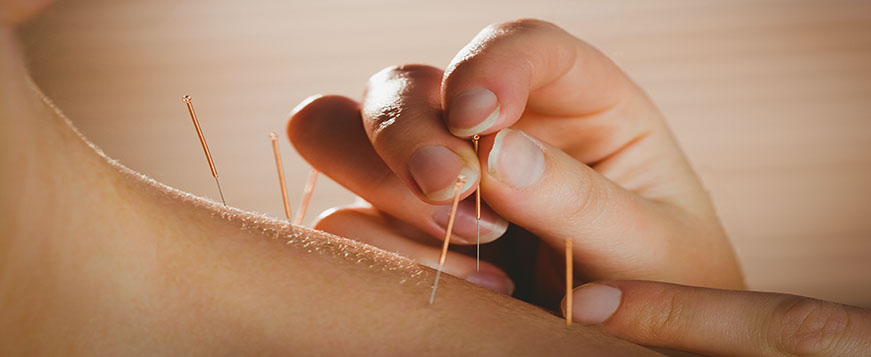
Acupuncture
Acupuncture, an important component of Traditional Chinese Medicine (TCM) was developed in ancient China, and has been used in the prevention and treatment of many conditions for over two thousand years. In TCM theory, a person is healthy when their body is in a balanced state. When there is imbalance in the body, illnesses may develop. The concept of qi (our vital energy, pronounced "chi") is central to TCM theory, which believes that when qi cannot flow through the meridians in our body, those blockages invite illness and pain.
Acupuncture is a technique that consists of inserting thin needles into the skin in specific parts of the body. These needle sites are called acupuncture points. The needles are used to stimulate the points along specific meridians in order to clear any blocked channels. Acupuncture is used treat a variety of diseases including, but not limited to, migraine headaches, pain, infertility, and insomnia.
When healthy, the body distributes an abundant supply of qi through its networks. However, any number of environmental and lifestyle stressors (e.g., pathogens, poor diet, overwork, emotional trauma, stress, or physical injury) can disrupt flow by either decreasing the supply of qi or clogging channels. Congestion at any part of the pathway impedes qi from reaching its destination, leaving vital organs undernourished, systems imbalanced, and the body susceptible to disease and discomfort.
TCM theory suggests that acupuncture unblocks energy channels in the body to restore the physiological functions of the related organs, thus alleviating a range of disorders, particularly those that involve pain. Acupuncture is used treat a variety of diseases, including, but not limited to, migraine and tension headaches, joint and nerve pain, infertility, and insomnia.
How does it work? It appears that the insertion of an acupuncture needle activates specific structures, known as receptors, and this results in a cascade of reactions within the human body. These processes induce the release of a number of chemicals such as endorphins, which can reduce the sensation of pain and increase pain threshold, thus alleviating pain-related suffering. Further research has revealed that acupuncture affects other chemicals such as serotonin, norepinephrine, dopamine and a series of neurotransmitters. These actions can at least partly explain the analgesic effect of acupuncture in pain management and how it assists in drug withdrawal.
Using modern technologies such as functional magnetic resonance imaging (fMRI), researchers have found that acupuncture can affect the activities of the limbic system in the brain, which is associated with emotions such as fear and anger. This may help explain its effect on insomnia, depression and anxiety.
The World Health Organization recognizes acupuncture as an effective form of treatment for a wide variety of diseases and symptoms/conditions (see next page).





